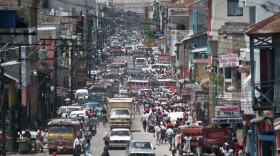ROBERT SIEGEL, HOST:
Nations across Latin America and the Caribbean are grappling with the rapid spread of the Zika virus. The mosquito-borne illness has been linked to brain damage in infants, and increasingly, the guidance to women is, this is not the time to be pregnant. NPR's Lourdes Garcia-Navarro is in Brazil, the nation that's been hardest hit by the virus so far, and she joins us from Rio de Janeiro. And Lourdes, tell us more about this guidance for women not to have children now.
LOURDES GARCIA-NAVARRO, BYLINE: Yeah. It's unprecedented, and it places the burden squarely on women. Authorities here in Brazil but also Ecuador, Colombia and Jamaica are encouraging women to delay getting pregnant. El Salvador has gone even further. It's asking women not to get pregnant until 2018. And as you can imagine, there's been a huge outcry by women's groups. You know, first, this is a part of the world where women often don't have a lot of control over when they get pregnant. There are high levels of teenage pregnancy. Sexual violence against women is very high, and in many poorer regions, women have little access to birth control.
At the moment, these are just guidelines. We haven't seen here in Brazil or in other parts of Latin America any active campaigns advocating for abstinence or anything else. These are simply guidelines of - that the various health ministries are giving women to protect themselves against the Zika virus.
SIEGEL: This health crisis has reopened a debate about abortion in the region. How is that debate unfolding?
GARCIA-NAVARRO: Yeah, it has. You know, abortion is illegal throughout much of Latin America. El Salvador, for example, has a blanket ban. They actually put women in prison who they suspect to have attempted to have an abortion. Here in Brazil, there are only rare cases it's allowed. So again, women's groups saying it's cynical to tell women who have no control, often, over when they get pregnant to delay it and then not to allow them a safe, legal way to terminate the pregnancy if the child has a severe birth defect like microcephaly. Even in a country like Brazil, which has a national health service, you know, infants with microcephaly are often not getting adequate treatment, and poor women may not have the resources to care for that infant. And so again, women's groups are saying, we need to reopen this debate.
SIEGEL: Lourdes, Brazil has had the biggest number of cases of Zika. What are the authorities there saying about that?
GARCIA-NAVARRO: Yeah. Today, it was announced at 220,000 soldiers - that's a quarter of a million soldiers, almost - will be sent out to help eradicate the mosquito that causes the Zika virus. That is the Aedes aegypti mosquito. They'll be going door to door, looking for standing water where the mosquito breeds. The health minister said that they're losing the fight against the insect that spreads Zika, which is the same one that also spreads dengue and chikungunya. Right now, Brazil is in a desperate search for a vaccine, but that is expected to take many years. So targeting the mosquito is considered vital. This is having huge repercussions in Brazil, Robert, where you already have around 4,000 infants with microcephaly and the suspected cause is Zika.
SIEGEL: The suspected cause is Zika. How strong is the evidence that microcephaly in these children is caused by the Zika virus?
GARCIA-NAVARRO: I've spoken to scientists here who are studying the disease. They believe it is probable, but they are really trying to nail down that link with absolute certainty. There's been very little research into Zika before now, so in many ways, investigators are starting from scratch, you know? They're trying to answer two basic questions. What is happening, and why is it happening? Why is Zika having this effect now?
One of the most worrying things is that most times, Zika will be asymptomatic. You won't know that you have Zica. It's only 1 in 5 times that you will have symptoms, which is a fever or rash, conjunctivitis in your eyes, aches and pains. But other times, you simply won't know that you have it, and so that's what makes it so dangerous, say scientists.
SIEGEL: That's NPR's Brazil correspondent Lourdes Garcia-Navarro speaking to us from Rio de Janeiro. Lourdes, thanks.
GARCIA-NAVARRO: You're welcome. Transcript provided by NPR, Copyright NPR.




